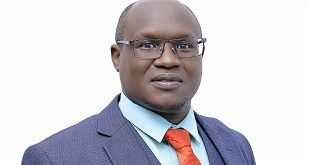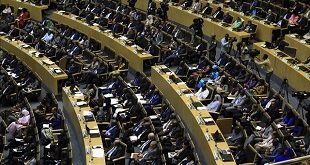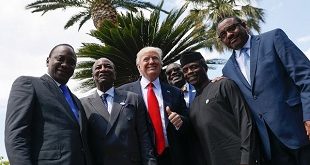
By Independent Reporter
Police chief says he is ready to battle opposition party militias
Badru Kiggundu, the soft-spoken Chairman of the Uganda Electoral Commission, knows something about disasters; at least theoretically. He is a specialist in geotechnical materials and, even as Dean of the Faculty of Technology at Makerere University; he chaired several conferences on earthquake disaster preparedness. So it is not inconceivable that these days he sometimes asks himself questions like: Will the elections end in disaster on Feb. 18?
 If they end in disaster Kiggundu might not blame himself – it appears it is not in his nature to accept blame, but others will blame him.
If they end in disaster Kiggundu might not blame himself – it appears it is not in his nature to accept blame, but others will blame him.
Already, the omens are not good for him. His Electoral Commission is not trusted even before it announces anything. There are counter accusations between presidential candidates of training and arming militias to `defend’ the election. Kiggundu has publicly listed nine such militias.
Even mundane items like whether to vote with or without voters cards, which have been used in all past elections, could not be negotiated and ended up in the High Court. The biggest opposition party, the Forum for Democratic Change and its partners in the Inter-Party Cooperation group that is fronting retired Col. Dr. Kizza Besigye say without voter’s cards, the elections cannot be free and fair. The High Court ruled against them. But everybody knows that the EC’s voter register, which it says will be the basis for voting, has been disputed and has never been reliable. Come Feb. 18, many people will arrive at polling stations and not find their names on the register. Chaos will erupt. Above this milieu of problems, Besigye’s party says it will announce its own `true’ results because the EC falsifies results. Is there any hope that post-election violence be avoided?
The latest report on Uganda by Human Rights Watch released on December 4, 2010 and titled: Preparing for the Polls: Improving Accountability for Electoral violence in Uganda, noted that violence is likely because perpetrators are rarely punished.
The Inter-Party Organisation for Dialogue (IPOD), a forum supported by donors to enhance dialogue between political parties, has struggled to get them to sign a piece of paper committing them to abjuring violence but everything seems ominously impossible.
Museveni’s opponents have accused the police of never acting professionally and always working to please the President and his NRM party.
In fact, Museveni’s biggest challenger, IPC presidential candidate Kizza Besigye, is currently campaigning without official police escort. Besigye is angry that his police escorts were detained after they intervened in an incident in which an NRM functionary was handing out cash bribes near his rally. The culprits walked scot-free possibly because they support NRM.
In the middle of this storm of suspicion is Maj. Gen. Kale Kayihura, the 55 year-old lean and hungry-looking Inspector General of Police.
A passionate and voluble person, Kayihura is a master of concealment. But he has said and shown that he is pre-occupied with avoiding a disastrous election. When he addressed a workshop of the Justice Law and Order sector (JLOS) on his election preparations, he called the night of the election, Feb. 18, the `Devil’s night’.
Those close to Kayihura say, usually, what he reveals actually conceals more than what it exposes. So when a convoy of over 50 police anti-riot equipment trucks; teargas and pepper sprayers, troop carriers, and water cannons, snaked into the capital Kampala on Jan. 15, the message was clear; Kayihura wanted the public to see that the police was beefing up its capacity to quell any violence.
 But in an interview with The Independent, Kayihura denied the tear gas and water cannons were meant for anticipated election chaos. He said the equipment was ordered way back in 2007 following the riots over government’s plans to sell part of the Mabira natural forest to a sugar company. But he said the police also had credible information that some opposition party leaders were planning to stage violence around election time.
But in an interview with The Independent, Kayihura denied the tear gas and water cannons were meant for anticipated election chaos. He said the equipment was ordered way back in 2007 following the riots over government’s plans to sell part of the Mabira natural forest to a sugar company. But he said the police also had credible information that some opposition party leaders were planning to stage violence around election time.
“We have evidence,” he said, “otherwise why would Besigye (FDC presidential candidate) want to have his own tally of election results?”
Kayihura added: “If they think we don’t know, they are mistaken”.
Besigye has also consistently accused the police of recruiting militias disguised as crime preventers.
While campaigning in Teso, he cited a group calling itself, Akuna Kulala. That name has an eerie ring to it. It is in Swahili but loosely means, “Nobody will sleep or have peace”.
Those who know Kayihura say they cannot accept his lectures on `non-lethality’ with a caveat.
After all, the army, headed by Kayihura’s bush-war comrade, Gen. Aronda Nyakayirima, and Lt. Col. Muhoozi Kainerugaba – son of one of the candidates, President Yoweri Museveni, must have plans too. And these are not being paraded. So, if Kayihura can deliberately unleash this show of force in the city in broad day light, what is his concealed game plan for ensuring a peaceful night of election? One of the observers said Kayihura’s plan involves denying the opposition recruits into their own militias. There are reports that individuals who have shown that they have gangs of youth they can summon at will have been given facilitation, including motorcycles, by Kayihura.
Kayihura’s desperation is, therefore, too huge to ignore. Recently, he has been on a morale raising campaign within the force.
When he came into office, only the luckiest officer had a neat uniform – the sky-blue introduced by his predecessor, Lt. Gen. Katumba Wamala. The rest wore threadbare grey outfits whose patches had become the butt of jokes and lived in dilapidated quarters build in the 1950s.The police were an angry lot.
Most police still live in dingy toilets converted into bedrooms, but they now at least have four pairs of uniform, walkie-talkies, and have so many bikes and motor vehicles that it is becoming common to find them being used to fetch water or carry charcoal from the market. They are still an angry lot.
But Kayihura cannot do more. His deputy, Julius Odwe, told a parliamentary committee last July that they had asked for Shs 201 billion for the election but it had been whittled down by ministry of Finance to a paltry Shs 92 billion. Still, that is big money for a force whose annual 2010/11 budget is Shs 231 billion, minus the Shs 82 billion they got in an emergency supplementary budget. However, that is a big leap from the Shs 167 billion in 2009/10 and Shs 131 billion the year before. The biggest component is to accommodate the new recruits which pushed the wage bill from Shs 94 billion last year to Shs 122 billion this year.
With his lean budget, Kayihura must accomplish an unprecedented feat. The number of voters has swollen from 10,450,788 in 2006 to 13.9 million and districts he must police from 80 in 2006 to 112. Under the election law, the Police is supposed to provide at least one constable at each of the 23,968 polling stations scattered across the country, provide escorts for election material and staff in transit and guard storerooms, and district and national tally centres. For the task, Kayihura has divided the country into 29 police districts.
According to police records, the force was 38,000-strong in 2009. Since then, massive recruitment in two batches of 4,500 and 5,500 has pushed the force to around 43,000- strong. Assan Kasingye, the force’s top Political Commissar said on Jan 28 that they needed 61,000 officers and men to provide enough protection. He repeated the allegation, without evidence, that some political parties were training militia. He said the force is currently below 40,000. Whatever the number, it will not be enough for the job.
Kayihura’s is grappling for solutions. Up to 2000 Uganda Prisons security personnel have been loaned to him, and the army –although not public yet, will definitely pitch in. However, at the cost of Shs 13.6 billion for recruitment and training, the bulk of security during the elections will be provided by a new group of about 16,000 specially recruited Election Police Constables supported by an unnamed but huge force of Crime Preventers. Unfortunately, the role of these two categories has come under suspicion.
Across the country, mainly at police stations, temporary shelters have been set up to house recruits. These will either become members of a Special Election Police or remain Community Crime Preventers. In most areas theses days, residents wake up to the noise of their military-style morning drills.
In Kampala huge tent villages have been set up at police stations and overloaded trucks ferrying them to training sites are an uncomfortably common.
Near The Independent offices at Kiira Road Police Station, four tents have been erected for recruits brought in from Kabalye Police Training School, in Masindi, western Uganda.
The tents, two army green and two white tents, house at least fifteen people each who sleep on mattresses spread on bare ground and living only walking space in between.
Surprisingly, these recruits are deployed for duty after less than two months training. Troop carriers take them to various parts of the city every morning. They are mostly in the Mobile Police Patrol Unit and Anti-riot Police Units. Similar poorly trained police during CHOGM 2007 called Special Police Constables (SPCs) were responsible for attacks on civilians during the Mabira Forest riots in April 2007.
It is now feared that the current force is being recruited for the same purpose. In the past, heavy deployment of security forces on Election Day has led to low turn-out of voters. In cases where determined voters venture to polling station, security personnel have been accused of deliberately causing confusion, firing bullets and teargas and stuffing the ballot boxes after scared election observers and opposition party agents have fled.
Some of these officers told The Independent that they were taken for training at Kabalye on June 25, 2010 and were deployed in Kampala in August, 2010. Standard training for police lasts nine months.
But Kayihura says the training is shorter because the recruits are merely to work during elections and be disbanded. But the recruits don’t know about that. One of them told The Independent he gave up his chapatti selling job to become a crime preventer to use the chance to become a police officer. He said since he is not educated enough to join through the formal structures, he hopes he can join as a crime preventer.
Kayihura also said the training had been changed to include more practical policing on the streets. Unfortunately, some of the recruits carry guns with live ammunition – a perfect recipe for disaster, according to observers.
“This training is specifically to intimidate the opposition supporters,” says Margaret Wokuri who heads the IPC Communications Bureau.
All crime preventers The Independent spoke to said they were recruited by their village Local Council leaders who are really functionaries of the NRM party. They said they were first taken for Chaka Mchaka, the para-military training offered in NRM institutions. They also said they were given yellow T-shirts, the NRM colour, during training.
But that they later had to fork-out Shs 10,000 to buy crime preventers T-shirt after they were deployed at a police station. “The police is a non-partisan job,” they were reportedly told. That is little consolation for the opposition. After all, what difference does changing the colour of a T-shirt matter to a force with a mission?
Apparently, the police’s plan is to deploy this force at rallies to ensure calm and resolve basic offenses. Riots and arrests are to be handled by the actual police.
 But these people worry the opposition. Wokuri says that even if these were really crime preventers, they can cause problems after the elections.
But these people worry the opposition. Wokuri says that even if these were really crime preventers, they can cause problems after the elections.
She likened these crime preventers to the Mungiki, in Kenya whom she said were recruited by politicians for election reasons but that they later became criminals threatening the peace of Kenyans.
She explained that it was not reasonable that the police recruit and train jobless youth because if they failed to earn what they wanted they would use the skills given to them to turn against the public they should be defending.
Alice Alaso, the Soroti woman MP and FDC Secretary General said her party had credible information that the over 100 crime preventers per police station would cause chaos so that the police can start shooting to make way for ballot stuffing. She said the so-called crime preventers were already beating up opposition supporters in Serere and Kumi districts.
It is, therefore, no secret that the police is carrying out massive recruitment of mainly youth as so-called crime preventers. Kayihura has been on tours across the country overseeing the exercise and says each village requires about 100 of them.
“Crime preventers have been there,” he told The Independent, “We are merely increasing the numbers. These are human CCTVs. In Britain you have over one million CCTV cameras but in addition they have neigbourhood watch.”
He denied that recruitment was based on loyalty to President Museveni’s NRM party and that the training involves plans on how to harass opposition candidates and supporters.
“We sensitise them about likely threats, methods of detection of crimes, and how to maintain discipline,” Kayihura said, “even with ISO and ESO, the police cannot be everywhere.”
But Bishop Zac Niringiye, the highly respected Chairperson of the Interreligious Council Taskforce for Peace and Conflict Transformation said there was no transparency in the recruitment and deployment was making the process suspicious.
He said they had evidence they are willing to share with the police and the Electoral Commission that it is the Resident District Commissioners (RDCs) involved in the recruitment process. The RDCs are representatives of the President and have often been accused of intimidating and sabotaging the opposition in their respective districts.
Niringiye added that recruitment for crime preventers was also being done alongside the recruitment of people going to Kyankwanzi to train for the NRM’s Prosperity for All programme.
“This noble arrangement can be abused by political actors,” Niringiye told Kayihura at Protea hotel where the EC had arranged a meeting to update political parties, civil society and donors on security arrangements for the elections.
 The Independent Uganda: You get the Truth we Pay the Price
The Independent Uganda: You get the Truth we Pay the Price


